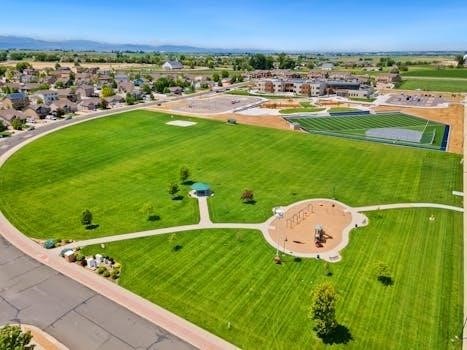
Our Town Play PDF⁚ An Article Plan
This article explores Thornton Wilder’s “Our Town,” a three-act play, initially published in 1938. The article will delve into its minimalist staging, the unique role of the Stage Manager, and the play’s exploration of life, love, and death within the fictional town of Grovers Corners. Key themes and the play’s impact will also be analyzed.

Thornton Wilder’s “Our Town,” a seminal work in American theater, first graced the stage in 1938, quickly establishing itself as a defining play. This three-act drama transcends conventional theatrical boundaries, offering a profound meditation on the ordinary aspects of life. The play is set in the fictional town of Grovers Corners, New Hampshire, and it chronicles the lives of its residents with simplicity and profound depth. Unlike many contemporary plays, “Our Town” is marked by its minimalist staging and its unique use of the Stage Manager as both narrator and a participant in the story. It is a Pulitzer Prize-winning play that has captured the hearts of audiences worldwide, and is a staple in school and community theater productions. The narrative of “Our Town” focuses on the everyday experiences of people, highlighting the beauty and poignancy found in the most common occurrences. Wilder’s work urges audiences to recognize the importance of each day, a theme that continues to resonate with modern viewers. “Our Town” remains an important work due to its simplistic yet effective approach to storytelling.

Thornton Wilder’s ‘Our Town’⁚ A Brief Overview
Thornton Wilder’s “Our Town,” penned in the 1930s and first published in 1938, stands as a landmark of American dramatic literature. This three-act play uniquely blends realism with modernist elements, creating a timeless depiction of life in a small New England town. Wilder, a three-time Pulitzer Prize winner, considered “Our Town” to be his finest work, reflecting his deep understanding of human existence. The play’s narrative unfolds in Grovers Corners, New Hampshire, between 1899 and 1913. It captures the daily rhythms of life, focusing on two families, the Gibbs and the Webbs. The play avoids traditional theatrical conventions, employing minimal sets and a Stage Manager who serves as both narrator and character. This structure allows Wilder to explore profound themes of life, love, and death in a uniquely accessible manner. The play’s structure, divided into three acts, each explores different stages of life, contributing to its overall message about appreciating the present. The play’s enduring legacy stems from its ability to resonate with audiences across generations, offering a poignant reminder to cherish each fleeting moment. “Our Town” is a play that is not just seen, but experienced.
Setting⁚ Grovers Corners, New Hampshire
The play “Our Town” is set in the fictional town of Grovers Corners, New Hampshire, a seemingly ordinary place at the dawn of the 20th century. This small town serves as a microcosm of American life, depicting a community of roughly 2,600 people, primarily engaged in farming. The setting is deliberately unremarkable, lacking any specific claim to fame, which allows the audience to focus on the universal experiences of its inhabitants. Grovers Corners is not merely a backdrop but an integral part of the play’s message, representing any small town where life’s simple rhythms unfold. The town’s layout, with its main buildings and familiar streets, is described by the Stage Manager, establishing a sense of intimacy and familiarity. The homes of the Gibbs and Webb families, situated next to each other, form the central hub of the play’s action. The community’s close-knit nature is evident in the daily interactions of its citizens, who are engaged in routines like newspaper deliveries, milk runs, and choir rehearsals. Grovers Corners, through its ordinary setting, highlights the beauty and depth of everyday life, making it a poignant space for the play’s exploration of profound human experiences. The setting is timeless, making the themes relevant to every generation.

The Minimalist Staging of ‘Our Town’
One of the defining characteristics of “Our Town” is its minimalist approach to staging. The play intentionally avoids elaborate sets and traditional theatrical conventions. The stage is typically bare, with only a few tables and chairs to represent the homes of the Gibbs and Webb families. This sparseness is not a limitation but a deliberate choice that enhances the play’s focus on the characters and their relationships. The absence of a curtain and elaborate scenery underscores the play’s universality, suggesting that the story could take place anywhere. The minimalist staging forces the audience to engage their imaginations, filling in the details of Grovers Corners themselves. This technique also allows the play to move fluidly between scenes and time periods, enhancing its reflective tone. The simplicity of the stage draws attention to the human element, emphasizing the everyday moments that the play celebrates. The use of minimal props and sets contributes to the play’s timeless quality, making it accessible to audiences across different eras. The lack of visual distractions directs the audience’s attention to the dialogue and emotions of the characters. This stripped-down approach showcases Wilder’s focus on the essence of life rather than the trappings of elaborate theatrical productions.
The Stage Manager⁚ Narrator and Participant
The Stage Manager in “Our Town” is a unique and pivotal character, serving as both the narrator and a participant in the play’s action. This character breaks the fourth wall, directly addressing the audience and guiding them through the story of Grovers Corners. The Stage Manager’s role goes beyond simple narration; he introduces characters, sets the scene, and provides historical and contextual information about the town. He also steps into minor roles within the narrative, interacting with the townspeople and becoming an active part of their lives. This dual role allows the Stage Manager to offer both an objective overview and an intimate perspective on the events unfolding. The Stage Manager’s presence creates a sense of meta-theatricality, drawing attention to the fact that the audience is watching a play. This unique character acts as a bridge between the world of the play and the audience’s reality, prompting reflection on the nature of life and time. The Stage Manager’s commentary often carries a philosophical undertone, encouraging viewers to contemplate the significance of everyday moments. His presence also provides the play with a sense of timelessness, emphasizing the cyclical nature of life in Grovers Corners. The Stage Manager’s role is crucial in shaping the audience’s perception of the play’s themes and message.
Act I⁚ Daily Life in Grovers Corners
Act I of “Our Town” meticulously portrays the daily routines and mundane activities of the residents of Grovers Corners, New Hampshire. The act opens at dawn, showcasing the town awakening to a new day. We are introduced to the Gibbs and Webb families, two central families in the community, as they go about their morning rituals. The milkman, Howie Newsome, makes his rounds, while the paperboy, Joe Crowell, Jr., delivers the local news. These simple acts highlight the ordinary rhythms of small-town life. The Stage Manager provides context, explaining the town’s layout and history, emphasizing the normalcy of their existence. The act focuses on the interactions between the families, their conversations, and their daily chores. The children, George Gibbs and Emily Webb, are introduced as they prepare for school, revealing their youthful perspectives on the world. The act emphasizes the value of these seemingly insignificant moments, setting the stage for the deeper exploration of life in the subsequent acts. The simplicity of the stage design mirrors the unadorned nature of life in Grovers Corners, drawing attention to the characters and their relationships. Act I establishes the setting and the characters, creating a foundation for the play’s exploration of life’s bigger questions. It highlights the beauty within the ordinary, showcasing the simple joys and routines that make up daily life.
Act II⁚ Love and Marriage
Act II of “Our Town” shifts its focus to the theme of love and marriage, specifically following the developing relationship between George Gibbs and Emily Webb. The act opens with a flashback to George and Emily’s courtship, depicting their awkward yet endearing interactions as they transition from childhood friends to romantic interests. Their conversations reveal the blossoming of love amidst their everyday lives. The act culminates in their wedding ceremony, a pivotal event that marks the start of their shared journey. The wedding is presented with a focus on the simple and sincere emotions involved, highlighting the importance of this milestone in the cycle of life. The Stage Manager continues to provide context, emphasizing the universal significance of marriage. The act explores the hopes and anxieties associated with love and commitment, showcasing the complexities of human relationships. The preparations for the wedding and the ceremony itself are depicted with a focus on the community’s involvement, highlighting the importance of social bonds. Act II contrasts with the simplicity of Act I, adding a layer of romantic idealism. It explores the challenges and joys of building a life together and delves into the emotional complexities of romantic relationships. This act emphasizes the importance of love and commitment in the continuation of life in Grovers Corners.
Act III⁚ Death and Reflection
Act III of “Our Town” delves into the poignant themes of death and the afterlife. The act opens in the town’s cemetery, where the deceased residents, including Emily Webb, reflect on their lives. Emily, who died during childbirth, is given the opportunity to revisit a specific day from her past, her twelfth birthday. This allows her to see life from the perspective of the deceased, highlighting the beauty and fleeting nature of ordinary moments that are often taken for granted. The act reveals the limitations of human perception, emphasizing the significance of cherishing each day. Emily’s experience is heartbreaking as she realizes the blindness of the living to the simple joys of existence. Her return to the cemetery underscores the finality of death and the importance of appreciating the present. The Stage Manager continues to provide commentary, further emphasizing the universal experience of death and the human struggle to understand its meaning. Act III is filled with a sense of nostalgia and regret, as the deceased long for the simplicity of their past lives. It serves as a powerful reminder about mortality and the importance of living each moment to the fullest. It encourages the audience to reflect on their own lives and appreciate the beauty in the mundane. The act concludes with a reflection on the cyclical nature of life and death, underscoring the enduring themes of the play.
Key Characters⁚ The Gibbs and Webb Families
The Gibbs and Webb families are central to the narrative of “Our Town,” representing the typical American families of the early 20th century. The Gibbs family consists of Dr. Gibbs, the town doctor, his wife, Mrs. Gibbs, and their children, George and Rebecca. Dr. Gibbs is a hardworking and respected figure in the community, while Mrs. Gibbs is depicted as a loving and slightly wistful mother. George, the elder child, is a baseball enthusiast with a developing sense of maturity, and Rebecca, his younger sister, adds a touch of innocence to their family. The Webb family includes Mr. Webb, the editor of the local newspaper, Mrs. Webb, a devoted mother, and their children, Emily and Wally. Mr. Webb is a reflective and observant character, and Mrs. Webb is depicted as a nurturing and practical woman. Emily, the eldest, is portrayed as a bright and thoughtful young woman. Wally, the younger brother, is a minor character, but his presence adds depth to their family dynamic. These two families are portrayed as neighbors who share a close-knit relationship and their everyday lives are the focus of the play. The interactions between both families and their community form the core of “Our Town”. The characters, with their simple ambitions, desires, and struggles, serve to illustrate the beauty and poignancy of ordinary life. Through their lives, the play explores universal themes of family, love, and loss.
‘Our Town’s’ Themes⁚ Life, Love, and Death
“Our Town” intricately explores the profound themes of life, love, and death within the seemingly mundane existence of the residents of Grovers Corners. The play highlights the beauty and significance of everyday moments, often overlooked in the rush of life. It emphasizes the importance of appreciating the simple joys of daily routines, such as sharing meals, having conversations, and observing the natural world. Love is presented as a natural and evolving force, depicted through the blossoming relationship between Emily Webb and George Gibbs. The play examines the complexities of love, from youthful infatuation to the commitment of marriage and the deep bonds of family. Death, the inevitable conclusion of life, is portrayed as a natural part of the human experience rather than a tragic event. The play explores the perspective of those who have passed on, allowing them to reflect upon their lives. Through the lens of death, the audience is encouraged to contemplate the fleeting nature of existence and the importance of living fully in the present. The juxtaposition of these themes allows the play to explore the full spectrum of human experience and to emphasize the preciousness of every moment. It serves as a reminder to cherish the simple, yet beautiful, aspects of life.
‘Our Town’s’ Legacy and Impact
“Our Town” has left an indelible mark on American theater, solidifying its place as a timeless classic. Its innovative approach to staging, using a minimalist set and breaking the fourth wall, revolutionized theatrical conventions. The play’s enduring popularity is evident in its consistent production by professional, community, and school groups, showcasing its universal appeal. The themes of everyday life, love, and mortality continue to resonate deeply with audiences across generations, making it relevant even today. “Our Town” has inspired countless other plays, films, and artistic works, demonstrating its influence on popular culture. The play’s ability to evoke a sense of nostalgia and reflection on the human condition has cemented its status as a powerful piece of art. It has also been praised for its ability to encourage audiences to appreciate the seemingly ordinary moments of their lives. The play’s success has also contributed to the legacy of Thornton Wilder, establishing him as one of America’s most important playwrights. Its exploration of universal themes, coupled with its innovative structure, ensures that “Our Town” will remain an impactful and beloved work for years to come.